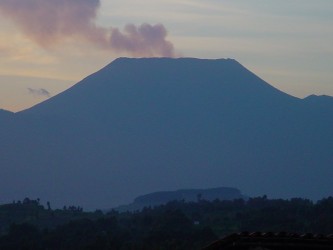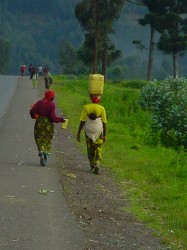
Nyiragongo Volcano looks just like a volcano should - smooth sides, a flat cone, and a trail of smoke wisping from the top. At night time you can even see a red glow reflected off the clouds from inside the crater. The volcano is ten kilometres over the Rwanda border inside the Democratic Republic of the Congo, but it dominated the skyline as I drove down into Gisenyi on Wednesday evening, for a meeting between the Rwandan Ministry of Finance and aid donors.
DFID is the biggest bilateral donor to Rwanda, with a programme of about £50 million per year supporting the development effort in the country - so, examining progress on our partnership is pretty important. I confess that the lapping waves of Lake Kivu just near the meeting room were a bit distracting, but we all focused down to think through the impact of the World Recession on Rwanda. While the G20 meeting at the London Summit this week might be concentrating on banking regulations and propping up car plants, we were looking at falling coffee prices (Rwanda's main export) as less people are sipping their cappuccinos in Starbucks, and tourism receipts tumble as fewer people take their trip to view the Rwandan mountain gorillas.

This recession really matters to poor people in Rwanda. Coffee farmers get paid less, and the Government of Rwanda's revenues drop, so there will be less money to buy school text books or to keep health centres supplied with drugs; similarly as the incomes of Western Governments fall, there is more pressure on their budgets - including the aid budget. And Rwanda is very aid dependent; about half of government spending comes from overseas aid; so any changes here could immediately impact on the lives of poor people. The Put People First campaign has highlighted the vital issues of poverty and injustice, impacting on the huge majority of Rwandans.
Fortunately, Rwanda had a good harvest last year due to good rains and more fertiliser use, and the recent drop in oil prices has helped to put a brake on rising inflation, but James Musoni, the Minister of Finance, was keen to stress to us all that maintaining aid flows is absolutely vital, as the world starts to feel the pinch.
Nyiragongo is an active and dangerous volcano, and is closely monitored to give a warning of a disaster like the 2002 eruption. Tracking the impact of the recession is equally vital to people who live in this vulnerable corner of the world.

4 comments
Comment by Naomi McBain posted on
Great that you are out there looking out for this nation. Howz those swallows of yours? And the bike riding? My coffee intake was pretty high this morning you will be glad to know. What is their coffee imported as? Just Star bucks or can we get it else where. Maybe we can look into using it for monday mornings in Hurst xx Lots of love
Comment by Chris Grose posted on
Juliet mentioned your blog the other day - great to catch up with your news and that of the CHARS programme in Bangladesh as well - good luck with your time in Rwanda and Burundi and I am happy to spread news of your blog amongst our alumni in the region and others in Hurstpierpoint if you wish! At IMA, we wish DFID every success there. Regards, Chris Grose
Comment by Martin Leach posted on
Naomi, Chris,
Great to hear from you both. Many thanks for your comments. Please feel free to spread the word on the blog if you are finding it interesting.
Naomi - Rwandan coffee is available in England. I did a quick Google search and saw that several major supermarkets and some specialist mail order companies have it available. To update you on the Swallows - they have built a nest in the eves of my balcony which I am very excited about, so we may soon get some baby swallows around just like in 'Dear Olly'. I will put in a picture of the nest in a future post. This probably shows that they are not the sort of swallows that fly to the UK in the European summer. Best wishes, Martin
Comment by Coffee Maker posted on
While Rwanda is not as well known a producer of coffee as Ethiopia for example, it does produce a reasonable quantity of arabica beans and some of them do find their way to the UK. As an espresso, Rwandan coffee has hazelnutty undertones and a hint of caramel, and is deliciously smooth. There are several suppliers in the UK, but they seem to only have it occasionally, so I regard it as a rare treat.